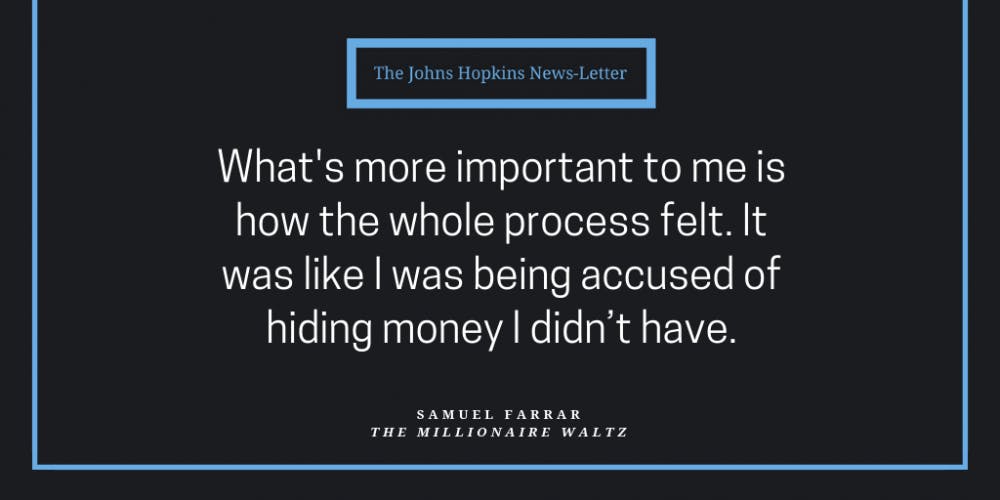
Every year, a good portion of this campus fills out their financial aid forms. Nobody has ever described this process as fun. For many of us our future at Hopkins is determined by the amount of aid we get, and that’s stressful. You have to be on top of all the different release dates, due dates, processing times and so on, and that’s stressful. Many times the financial aid office can be hard to reach as they take their time to respond to emails or forget to return calls all together, and that’s stressful.
When you add College Scholarship Service (CSS) and Institutional Documentation Service (IDOC) on top of Free Application for Federal Student Aid (FAFSA), Hopkins’ financial aid application process is more intensive than that of many peer institutions, and that’s also stressful.
This stress is universal for aid applicants, and there is some reassurance in being able to talk to people that dealt with the same thing. However, there are also some unique experiences that make the process a whole other level of onerous. As a first-generation student, it may be more difficult to navigate the complexity of the application process. This is especially true if you have another barrier to break down — for example, if English isn’t the main language spoken in your household.
For me, that extra barrier came from the fact that I come from a single-parent household. For FAFSA and CSS, I imagine the process isn’t that far from what students from two-parent households experience, maybe even a tad easier. I just check whatever boxes are needed to indicate my household status and fill out all the necessary financial information.
The problems come with IDOC, the platform where you upload tax and income documents. Even as a member of a single-parent household, documents from the non-custodial parent are still requested. For a lot of people, this makes sense. Many people have contact with their non-custodial parent on a regular basis, from formal split-custody to any informal arrangements in which the non-custodial parent is still involved in their life.
For me this is not the case. My last contact with my father came in 2012. I don’t know where he lives, what job he has — I don’t even know if he has the same name now. When it came time to get his tax documents, I got worried.
If I wanted to, I’m sure I could have contacted him, but that would have been unhealthy. Reestablishing communication would have opened the wounds I had spent all of middle and high school trying to patch up. But I thought it was my only option.
My mom reminded me that I wasn’t the only person to attend Hopkins with a similar situation, and she pushed me to ask my advisor about what I should do. Lo and behold, there was an option for me — the non-custodial parent waiver. While I was a little peeved that I wasn’t informed about this option before, at least I had it now.
I was told to get some documents and write a description of my situation. My mother also had to write a statement, along with two people outside our family which knew the situation (those had to get notarized, too). When that was all processed, we were told that since we mentioned child support in our statements, we had to go to the courthouse and retrieve the judge’s orders for the payments. When that wasn’t good enough, we went back to get a record of the complete payment history, along with the court order that garnished his wages as punishment for non-payments.
When it was all said and done, I was asked for a final time if I could get any tax or income information for my father, and when I said no, the waiver was finally approved.
I had a few problems with this process. For one, it was fairly expensive, not only in the price for document copying or notarization, but the wage-hours lost during it. We were notified what we needed one document at a time, which means each time we submitted one, my mom had to take off another few hours from work to get the next one. Never mind the irony in having to pay for forums declaring your inability to pay, the whole process was set up in a way that was most difficult in low-income wage earning households.
However, what's more important to me is how the whole process felt. It was like I was being accused of hiding money I didn’t have. I know why Hopkins has to do this; there are donors that the university has to justify its spending to, but the general hostility I was met with in the process made an already emotionally taxing process all the more difficult.
I used to think this was just a personal experience, but the more I talk to other people from one-parent households, the more I see that it is a systemic issue in the financial aid department at Hopkins. Many of those who didn’t interrogate their way into a waiver were forced to reestablish contact with potentially toxic family members. Neither option is without pain and frustration. It is a system that works against the students it is supposed to serve.





